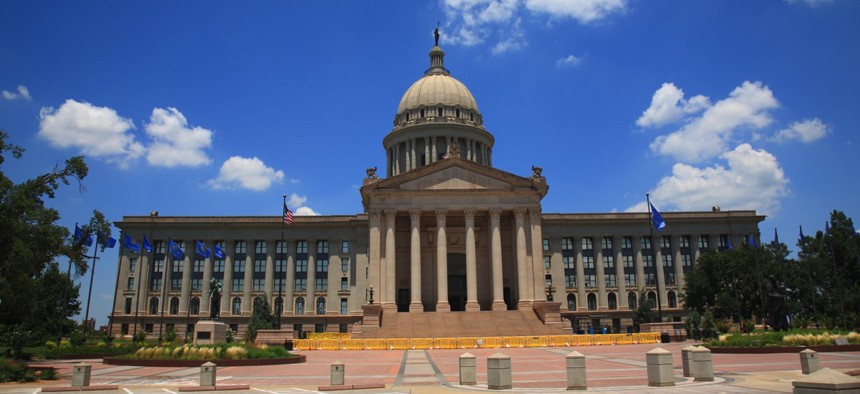Okla. Senate OKs Bill to Strip Local Non-Discrimination Ordinances

Oklahoma State Capitol Building
Also in our State and Local Daily Digest: Proposal to block new wind development in N.D.; N.C. governor’s plan to raise teacher salaries; and a Mich. freeway’s bumpy deterioration.
STATE AND CITY RELATIONS | A legislative proposal that passed the Oklahoma Senate on Monday would strip non-discrimination ordinances passed by Norman, Oklahoma City, Tulsa. The bill has alarmed members of Oklahoma’s LGBT community and municipal leaders, who contend the wording of the bill would allow the state to preempt any local government regulation. [The Tulsa World]
ENERGY | There would be a two-year moratorium on new wind energy development in North Dakota under a bill the state Senate is set to consider this week. The bill also calls for a Legislative Management study of a “long-term energy plan for the state.” State Sen. Dwight Cook, a Republican, said the measure is meant to ensure North Dakota has a “reliable and affordable source of electricity in the future” and to “save coal.” [The Bismarck Tribune]
EDUCATION | North Carolina Gov. Roy Cooper said Monday his budget proposal would include 5 percent raises, on average, for teachers during each of the next two years. The plan would cost $813 million and would not involve raising taxes. [The Charlotte Observer]
SETTLEMENTS | Missouri lawmakers want the state’s attorney general to provide monthly reports on a fund used to pay settlements in lawsuits against the state. The expenditures have come under scrutiny after reports of harassment and discrimination in the Missouri Department of Corrections. The state Legislature appropriated about $30 million over the last five years for the legal expense fund—close to $60 million was spent. [St. Louis Post-Dispatch]
REFUGEES | An influx of refugees into formerly dwindling communities along Upstate New York’s Erie Canal has had a revitalizing effect on jobs, schools and economic development. In all, these towns took in nearly 95 percent of the roughly 5,000 refugees the state took in during the last fiscal year. Buffalo has been particularly quick to take in these groups of people. Surprisingly, it may have actually been the economic stagnation in this part of the state that attracted refugees in the first place. As industries upstate changed, “[p]eople left and left housing vacant,” said Shelly Callahan, the executive director of the Mohawk Valley Resource Center for Refugees in Utica. “So when refugees came in, the prices were cheap, and they were ready to put in the sweat equity that a lot of people weren’t anymore.” [The New York Times]
INFRASTRUCTURE | Outside Grand Rapids, Michigan, the pavement joints on a stretch of the M-6 freeway built in 2004 has deteriorated to such an extent that drivers hit patched gaps every 14 feet over many miles. The Michigan Department of Transportation has moved up planned repairs by a year to deal with the situation and will replace three miles of pavement this year. [The Grand Rapids Press / MLive.com]
WILDLIFE PROTECTION | A collaborative effort involving the U.S. Coast Guard, National Oceanic and Atmospheric Administration and the Hawaii Department of Land and Natural Resources called Operation Kohola Guardian is aiming to protect a population of 12,000 humpback whales that travel to the waters off Hawaii every year and make sure fishing and tourist vessels keep their distance. “It’s kind of a minefield,” a NOAA resource protection specialist said. “We check up on the tour boats, keep them honest.” [Honolulu Civil Beat]
INVESTIGATIONS | The North Carolina State Bureau of Investigation took control of Hoke County government offices Monday to investigate the timesheets and pay records of at least five employees for criminal activity. The district attorney and sheriff requested the investigation. [WRAL.com]





